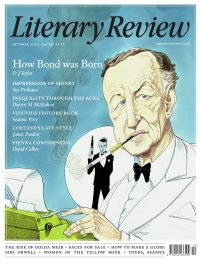Daniel Swift
Print for Victory
The Book at War: Libraries and Readers in an Age of Conflict
By Andrew Pettegree
Profile Books 480pp £30
In December 1940, as German bombs were falling on London, Virginia Woolf was reading ‘a very accurate detailed book’ about the Great Fire of London three centuries before. Like the country, Woolf was in a crisis this winter. ‘What is the phrase I always remember – or forget’, she wrote in her diary, and then slightly misquoted a line from a poem by Walter de la Mare: ‘Look your last on all things lovely.’ She consoled herself ‘musing; reading; cooking; cycling; oh & a good hard rather rocky book.’ ‘This is my prescription,’ she wrote. She was being gently ironic, for she knew that books would not save her. In less than three months, she would be dead by suicide, and the war would go on.
‘We tend to assume books and literary culture have a positive impact on the world, informing, enlightening, assisting the cause of progress,’ notes Andrew Pettegree at the start of his wide-ranging The Book at War. This is Woolf’s ‘prescription’: the old liberal humanist idea that literature can transport us to a different, purer world and teach us ethical values. But books, Pettegree argues, were central to the wars of the 20th century. The two world wars, he observes, were fought between ‘the world’s most bookish nations’. Even more than this, ‘the Second World War pitted in opposition war leaders who were also bestselling authors’. The journalist and memoirist Winston Churchill later won the Nobel Prize in Literature; Adolf Hitler, author of the bestselling Mein Kampf, had a good library. A work by another leading combatant, Mao’s Little Red Book, eventually sold something like a billion copies.
What such figures shared was a ‘belief in the power of the written word to shape the destiny of nations’. Pettegree traces the practical and symbolic roles played by books and literary culture in modern wars. It’s a vast subject and Pettegree takes us on a remorselessly interesting

Sign Up to our newsletter
Receive free articles, highlights from the archive, news, details of prizes, and much more.@Lit_Review
Follow Literary Review on Twitter
Twitter Feed
Under its longest-serving editor, Graydon Carter, Vanity Fair was that rare thing – a New York society magazine that published serious journalism.
@PeterPeteryork looks at what Carter got right.
Peter York - Deluxe Editions
Peter York: Deluxe Editions - When the Going Was Good: An Editor’s Adventures During the Last Golden Age of Magazines by Graydon Carter
literaryreview.co.uk
Henry James returned to America in 1904 with three objectives: to see his brother William, to deliver a series of lectures on Balzac, and to gather material for a pair of books about modern America.
Peter Rose follows James out west.
Peter Rose - The Restless Analyst
Peter Rose: The Restless Analyst - Henry James Comes Home: Rediscovering America in the Gilded Age by Peter Brooks...
literaryreview.co.uk
Vladimir Putin served his apprenticeship in the KGB toward the end of the Cold War, a period during which Western societies were infiltrated by so-called 'illegals'.
Piers Brendon examines how the culture of Soviet spycraft shaped his thinking.
Piers Brendon - Tinker, Tailor, Sleeper, Troll
Piers Brendon: Tinker, Tailor, Sleeper, Troll - The Illegals: Russia’s Most Audacious Spies and the Plot to Infiltrate the West by Shaun Walker
literaryreview.co.uk